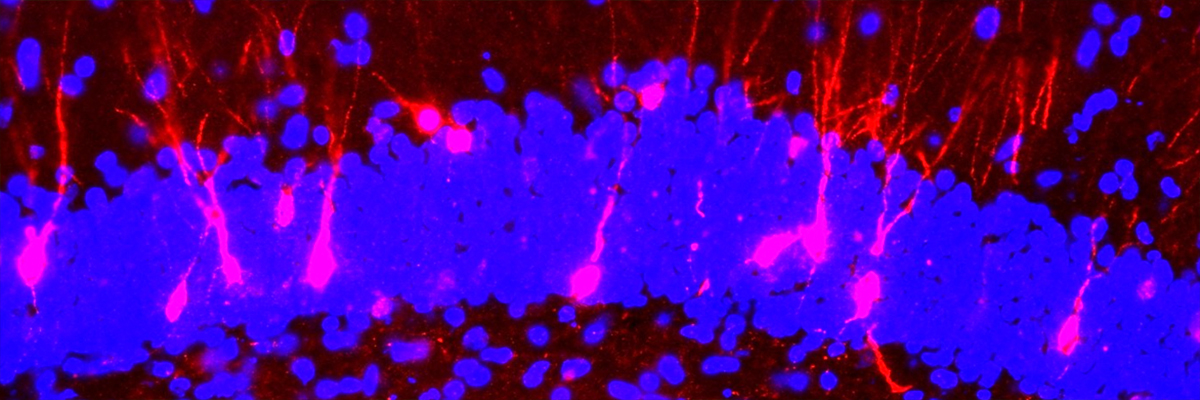Cognitive Neuroscience Track
The cognitive neuroscience track offers advanced study and research training for students seeking to become leading scientists and scholars in the field

The Cognitive Neuroscience track within the PhD program in Cognition and Neuroscience offers advanced study and research training for students seeking to become leading scientists and scholars in the field of cognitive neuroscience. Research in cognitive neuroscience encompasses all aspects of cognition, including studies of perception, memory, reasoning, decision-making, neuroplasticity and neuro-engineering. Please see this site for the Systems and Cellular Neuroscience Track in the PhD program.
The Cognitive Neuroscience track offers a distinctive blend of research initiatives and doctoral study in the neural processes underlying sensation, perception, memory, learning, language, and executive function throughout the lifespan. Students may focus, for example, on perception and memory for complex information patterns such as faces, speech, language, music, and text; reasoning and decision-making processes in conditions such as brain damage and addiction; or memory and executive function processes in normal and pathological aging. Finally, the program has unique strengths in artificial neural networks and neuro-engineering.
Doctoral students in the cognitive neuroscience track benefit from the rich intellectual climate in the School of Behavioral and Brain Sciences (BBS), including weekly lectures and research presentations by students, faculty, and visiting scholars. The school hosts an annual colloquium series presented by internationally known scientists, and the school’s six centers periodically offer colloquia, symposia and workshops that are freely available to graduate students. Doctoral students may receive funding support for presenting their research at professional meetings and conducting their dissertation research. Finally, doctoral students are provided with a variety of other professional development experiences, including opportunities to develop their teaching and grant writing skills.
Facilities
The offices and research facilities of the School of Behavioral and Brain Sciences are located on UT Dallas’ Richardson campus, as well as in BBS centers located in Dallas near the campus of the UT Southwestern Medical Center. Facilities at all locations include classrooms and research laboratories for studies of neuroscience, psychology, and communication across the lifespan in both typical and clinical populations.
The PhD program in Cognitive Neuroscience offers exceptional research facilities on the Richardson campus, including state-of-the art laboratories for investigating cognitive, behavioral, psychophysiological, and neuropsychological processes, as well as for conducting advanced mathematical analyses and modeling. In addition, the school’s centers, such as the Center for BrainHealth and the Center for Vital Longevity, house outstanding research facilities for the study of cognitive neuroscience, including cutting-edge brain imaging technologies (e.g., TMS, EEG, MRI) for identifying the neural signatures of learning and cognition, aging, and disease. Collaborative arrangements with the UT Southwestern Medical Center expand student research opportunities through additional access to clinical populations and neuroimaging facilities (e.g., PET and MEG imaging).
Degree Requirements
The PhD program in Cognition and Neuroscience is divided into two tracks: Cognitive Neuroscience (degree plan) and Systems and Cellular Neuroscience. This page has specific information for the cognitive neuroscience track. For more information on the other track, visit the Systems and Cellular Neuroscience page. Coursework and some degree requirements differ between the two tracks, but all students are required to complete a minimum of 75 semester credit hours beyond the baccalaureate degree. Program completion typically takes five years, although it is possible to meet all the requirements in four years. During the first two years of the program, each student works closely with the faculty in completing an empirical research project and in writing a substantive literature review or grant application. In the third year, students advance to PhD candidacy by successfully defending a proposal for their dissertation — an independent and original research project conducted under faculty supervision. Successful public defense of the completed dissertation is the final step in attaining the doctoral degree.
The UT Dallas graduate catalog provides information on degree requirements for the PhD in cognition and neuroscience; for updates please contact cogneurophd@utdallas.edu. The university’s course look-up site, CourseBook, describes some of the program’s specific courses. The Office of Graduate Studies is able to provide information on academic and other policies.
Admissions
The Cognition and Neuroscience PhD is a research degree. It is essential that there is a close match between a student’s research interests and the research interests and expertise of the faculty. Prospective students should contact faculty with whom they might share research interests. A primary consideration in PhD admission is a faculty member’s agreement to serve as the student’s mentor. The cognitive neuroscience admissions committee evaluates applications on several dimensions, including prior GPA, letters of recommendation, GRE scores (note: GRE score requirements are currently waived 2020-2024), prior research and professional experience, commitment to scholarship, and fit between the research interests of the applicant and faculty. Additionally, applications are evaluated on criteria aimed to incorporate a holistic assessment of a candidate, allowing for a more diverse set of skills and achievements to be considered in addition to the more traditional dimensions.
Typically, applicants have an average undergraduate cumulative GPA of 3.0 or above, and completion of an undergraduate degree in a related major is advisable (i.e., psychology, neuroscience, biopsychology, etc). Completion of a master’s degree is not required. Applicants without a prior degree in a related field should contact the program head or academic support coordinator for prerequisite coursework.
Applications to the PhD program must include official transcripts, GRE scores*, three letters of reference from people qualified to evaluate your potential for successful doctoral study, a CV, and a statement of purpose detailing your previous research and professional experiences, your current research interests, and your career goals.
International applicants must provide proof of English proficiency via TOEFL, IELTS, or PTE meeting university minimum requirements.
* GRE scores waived for Fall 2022-25 applicants. Submission of GRE scores (general or subject tests) are optional.
To Submit an Application
Please see the enrollment page of the UT Dallas Office of Graduate Admissions for general details on how to submit an application or see the following page to see specific instructions for completing an application to the Cognition and Neuroscience PhD Program.
Completed applications must be received on or before December 1 for admission the following fall. There are no spring or summer admissions.
You can check the status of your application using the university’s Orion program.
Questions about the application process can be directed to:
Cognition and Neuroscience Doctoral Program
School of Behavioral and Brain Sciences
The University of Texas at Dallas
800 W. Campbell Rd., GR41
Richardson, TX 75080
cogneurophd@utdallas.edu
Graduate Application Fee Waiver Program
The Office of Graduate Education and the Office of Admission and Enrollment at The University of Texas at Dallas are pleased to offer a Graduate Application Fee Waiver Program to qualified participants (past or present). To qualify, students must be applying for a PhD or Master’s degree at UT Dallas. Non-degree applicants are not eligible for fee waivers. Only U.S. citizens, or permanent residents, are eligible to request a fee waiver. Current and former UTD students and service members (and veterans) are given fee waivers automatically.
Financial Aid
Financial support of full-time doctoral students in cognition and neuroscience is awarded through teaching or research assistantship stipends and tuition scholarships. Admitted students are automatically considered for these sources of financial aid.
Other information on financial aid for graduate students is available on the UT Dallas graduate admissions page.
Frequently Asked Questions (FAQ)
What’s the Difference Between the Cognitive and Systems & Cellular Tracks?
Cognitive neuroscience research in the School of Behavioral and Brain Sciences (BBS) includes research in human psychology, including memory, perception, music and addiction. It is centered in our Department of Psychology and utilizes human neuroimaging tools such as MRI, EEG and PET. New students are directly admitted to a single research laboratory.
Systems neuroscience research in BBS focuses on neurobiological approaches in neuroscience, including molecular, cellular, and systems approaches in animal models and humans. Research foci include learning and memory, stress, addiction and pain. It is centered in our Department of Neuroscience. New students typically rotate through multiple research laboratories prior to joining a single laboratory. Our emphasis is on choice and finding the perfect fit for your research.
Is Financial Aid Available for Students?
Financial support of full-time doctoral students in cognition and neuroscience is awarded through teaching or research assistantship stipends, as well as tuition scholarships. Admitted students are automatically eligible for these sources of financial support. Please see the UT Dallas Graduate Admissions site for information on other sources of financial support for PhD students. All students receive health insurance paid for by the program.
What is UT Dallas Like?
The University of Texas at Dallas recently was ranked third among U.S. universities founded in the past 50 years and is in the top 20 such universities worldwide. The total enrollment is approximately 25,000, with more than 8,000 graduate students. The main UT Dallas campus is in Richardson, Texas — about 15 miles north of downtown Dallas. However, several research centers of the School of Behavioral and Brain Sciences are located in Dallas, near the campus of the UT Southwestern Medical School. Both Richardson and Dallas are vibrant with opportunities for art, drama, music, athletics, and other activities. Visit the UT Dallas visitors website for more information about the University.
What are Richardson and Dallas Like?
Richardson and Dallas are richly diverse cities located in one of America’s largest and fastest growing metropolitan areas. The Dallas area boasts 50,000 acres of public park land, the nation’s largest urban arts district with an excellent symphony orchestra, opera, and art museums, five major sports franchises, multiple entertainment districts, and a thriving culinary scene. The DART rail system runs from the suburbs of Plano and Richardson to the arts district, downtown Dallas, and DFW airport. Yes, it is hot in the summer, but the average annual daily temperature is 65 degrees (spring, fall, and winter are great!). The area offers a reasonable cost of living and an abundance of sunshine.
Where Should I Live?
Most doctoral classes are held on the main UT Dallas campus in Richardson. Depending on the lab location of your faculty advisor, your duties as a research assistant may take place on the main campus in Richardson or at one of the centers in Dallas. Some student housing is available on the main campus in Richardson, but on-campus housing caters primarily to undergraduates. You can use online search engines to find options that fit your price range and target location.
What is the Admissions Process Like?
The admissions committee evaluates applications on several dimensions, including research experience, GPA and GRE scores (not required), letters of recommendation and personal statements. In addition, the fit between the research interests of the applicant and faculty is very important. One to three preferred faculty mentors should be named in the application.
The admissions committee invites a short list of qualified candidates to visit UT Dallas for an interview. Admissions decisions generally are made in February, and admissions offers must be accepted or declined by April 15.
Completed applications must be received on or before December 1 for admission the following fall. There are no spring or summer admissions.
Should I Contact Faculty Members I Would Like to Work with Before I Apply?
Yes. We encourage you to identify faculty who share your research interests and contact them about current opportunities for admission. A primary consideration in PhD admission in the Cognitive Neuroscience track is a faculty member’s agreement to serve as a student’s mentor. For the Systems Neuroscience track, there are options to do rotations with multiple faculty to determine the best fit for you.
When are Admissions Decisions Made?
Decisions on admission are made in mid- to late- February.
How Big is the PhD Program and How Many PhD Students are Accepted Each Year?
There typically are 60-70 students enrolled in the cognition and neuroscience PhD program. We accept, on average, 10 new students per fall semester into the Cognitive Neuroscience Track and 10 new students per fall semester into the Systems and Cellular Neuroscience Track.
What are the Outcomes for Graduates?
Over the last five years, the cognition and neuroscience program has graduated 43 PhD students. Of the 43 graduates, 30 have continued their careers at institutions of higher education, while 11 of our graduates have found employment in the private sector.
What Makes this Program Unique?
The PhD program in cognition and neuroscience overlaps with other programs in BBS. For example, many students do research and take courses in neuroscience, psychology and audiology. BBS provides an atmosphere where students are encouraged to learn from and work with experts in other programs. The cognition and neuroscience program can be distinguished from the other BBS programs by the focus on understanding the neural basis of behavior, cognition, perception, and sensory and motor processing.
Should I Apply for the Master’s Program or the PhD Program?
This depends on your goals. The master’s degree is appropriate for students interested in cognition and neuroscience training beyond the undergraduate level, or additional training to prepare them for doctoral programs or medical school. The PhD program is appropriate for students interested in careers in research and teaching and involves extensive training in research design and methodology.
Should I Apply for the PhD Program in Cognition and Neuroscience or Psychology?
These two programs have a number of things in common. There is overlap in some coursework of these programs and many of the faculty members involved in the Cognitive Neuroscience track are involved with both programs. The cognition and neuroscience program focuses more narrowly on cognitive neuroscience or systems neuroscience, including basic neurobiology (e.g., animal behavior and neurophysiology). The psychology program allows for broader training in psychology; students can select a concentration in developmental psychology, cognitive psychology or social/personality psychology. One way to decide what program may be best for you is to think about what type of department with which you see yourself affiliated in the future, and which degree best serves your career goals. The main departments serving the PhD programs are the Department of Neuroscience, Department of Psychology, and Department of Speech, Language, and Hearing. Please reach out to us at cogneurophd@utdallas.edu if you want to discuss your choice more.
Program Contacts
Cognitive Neuroscience Track Director
Kristen Kennedy, PhD
kristen.kennedy1@utdallas.edu
Academic Support Coordinator
Ashton Nance
psysciencesphd@utdallas.edu
For Additional Program Information
Cognition and Neuroscience Doctoral Program
School of Behavioral and Brain Sciences
The University of Texas at Dallas
800 W. Campbell Rd., GR41
Richardson, TX 75080
psysciencesphd@utdallas.edu
PhD Student Guide
The PhD student guide provides information on policies and procedures in the PhD programs in the School of Behavioral and Brain Sciences.
PhD Student Forms and Information
Forms and Information
Degree Plan for Cognitive Neuroscience Track
Cognitive Neuroscience
Registration and Related Forms
Graduate Change of Program
Register, Add, Drop, Withdraw
Repeated Course Grade Adjustment
Transfer of Credit Request
Milestones and Annual Reporting Forms
Milestones Agreement Form
Cognition and Neuroscience Annual Report
Qualifying Papers and Projects – Cognitive Neuroscience Track
Qualifying Plan 1: Thesis
Overview of Qualifying Plan 1 – Cognitive Neuroscience
Qualifying Thesis Committee Membership
Qualifying Thesis Proposal Approval
Qualifying Thesis Final Approval
Public Presentation of Research Project
Request for Extension
Qualifying Plan 2, Part 1: Research Project
Overview of Qualifying Plan 2 – Cognitive Neuroscience
Research Project Proposal
Public Presentation of Research Project
Request for Extension
Qualifying Plan 2, Part 2: Integrative Literature Review or Grant Application
Integrative Literature Review Proposal
Grant Application
Request for Extension
Dissertation
Committee Appointment Form
Dissertation Proposal Meeting
Public Presentation of Dissertation Proposal
Request for Final Oral Exam
Priority Deadlines FAQs
Memo – Absent Committee Member
Memo – Committee Member Attending Remotely
Checklist for Final Submission of Doctoral Dissertation
UTDPP1052
Teaching and Research Assistantship Forms and FAQs
UTDPP1075
Requests for Student Travel and Dissertation Support
Student Request for Travel Support
PhD Research Small Grants Program Application
Program Resources
Please visit the Office of Graduate studies for additional information on academic policies, PhD deadlines, PhD forms, guidelines for preparing dissertations, and a profile of characteristics of doctoral programs at UT Dallas.
Student Achievement Data
View the Student Achievement Data on the Callier Center for Communication Disorders page.






